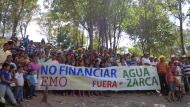Indigenous protest against Agua Zarca dam in Honduras criminalised
Image: Tomás Garcia, COPINH leader killed by the military. Photo: Colectivo Ocote.
For further information please contact:
Magdalena Heuwieser, Honduras-Delegation; +43 6503773102, m.heuwieser@yahoo.de
Johan Frijns, coordinator BankTrack +31 612421667, johan@banktrack.org
Image: Tomás Garcia, COPINH leader killed by the military. Photo: Colectivo Ocote.
For further information please contact:
Magdalena Heuwieser, Honduras-Delegation; +43 6503773102, m.heuwieser@yahoo.de
Johan Frijns, coordinator BankTrack +31 612421667, johan@banktrack.org
On September 12, three leaders of the Council of Popular and Indigenous Organizations of Honduras (COPINH) must appear in court to face trumped up charges by the Honduran regime and DESA, a hydroelectric dam company. Berta Caceres Aureliano Molina and Tomas Gomez, are being brought to court under charges of being "intellectual authors" of the anti-dam movement opposing the Agua Zarca dam and inflicting damage on property of DESA.
The highly politicized case is aimed at criminalizing COPINH and breaking the strong resistance of the Lenca indigenous communities to illegal damming, logging, and mining operations in their ancestral territories, in particular the construction of the Agua Zarca hydro electric project. This project, with a planned capacity of 22 MW, started construction in 2011 in the Lenca region Río Blanco in western Honduras and is currently reported to be 15% complete.
Agua Zarca is owned by the Honduran company DESA and constructed by the Chinese corporation Sinohydro, the German company Voith Hydro (a joint venture between Voith and Siemens) and the Centroamerican company COPRECA. It is financially supported by the Central American Bank for Economic Integration (CABEI) which provided DESA with a US$ 24.4 million loan. CABEI mentions as co-financiers the Netherlands Development Finance Company (FMO) and the Central American Mezzanine Infrastructure Fund (CAMIF), a investment fund managed by EMP Global.
Since the beginning of construction, the vast majority of the local Lenca population, organized in the wider regional indigenous movement COPINH, has expressed its fear of losing access to the river and water supply, and of the destruction of communal lands necessary for subsistence farming. Until now, their opinion and their right to withhold Free Prior Informed Consent to the project, as granted to them in the ILO Convention 169 and ratified by Honduras, has been ignored.
The dam project is being forcefully implemented, resulting in the violation of indigenous land rights, the militarization of the Río Blanco area, intimidation of dam opponents and violent repression of the street blockade which the local population has maintained since 1st April 2013. This repression has included the shooting of peaceful protesters on 15th July by the military, an event in which one local indigenous leader (Tomás Garcia, pictured) was killed and several other protesters were injured.
Berta Cáceres, the General Coordinator of COPINH and an internationally recognized social movement leader, makes clear that COPINH rejects the dam as it threatens to destroy indigenous ways of life and because of the undemocatic and violent imposition of the project on them: "Our rejection isn´t against truly clean energy production. We aim at a development based on human dignity, on respect for mother earth, on the fragile equilibrium between human beings and our planet. We aim at an energy production which respects ecosystems, human rights, territorial, cultural and indigenous rights."
If the court convicts and imprisons the three indigenous leaders, this would be a heavy blow against the indigenous Lenca resistence and many other struggles in defense of Honduran territory against the violent and undemocratic imposition of such power projects.
The resistance of COPINH against the project is supported by an ever growing number of international allies. BankTrack has recently joined this alliance of supporters, focusing its attention on the financiers of the project, specifically Dutch development bank FMO. We are questioning whether they have met their own policies on stakeholder engagement and respect for indigenous rights when financing this project, and seeking a formal position from them on the violent oppression of the indigenous resistance. Updates on this will be posted on the Agua Zarca profile on the BankTrack website.
Notes for editor:
for further details on the project see:
http://www.banktrack.org/show/dodgydeals/agua_zarca_dam
See http://www.banktrack.org/show/dodgydeals/agua_zarca_dam#tab_dodgydeals_finance
See http://www.banktrack.org/show/dodgydeals/agua_zarca_dam#tab_dodgydeals_issues for a summary of concerns
See http://org.salsalabs.com/o/2486/p/dia/action3/common/public/?action_KEY=13935

